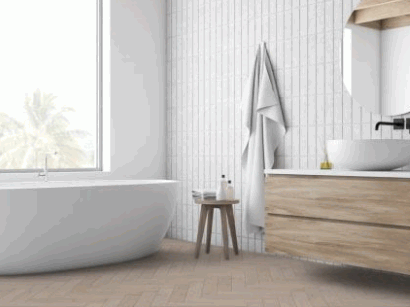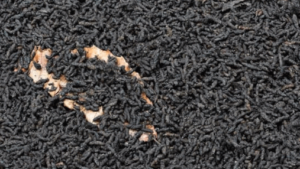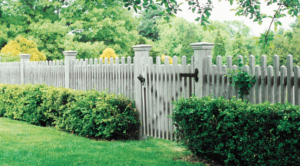Are you tired of constantly replacing cracked, stained, and unattractive flooring in your bathroom? Look no further. In this article, we will explore the benefits and drawbacks of using resin flooring in bathrooms. Say goodbye to traditional flooring problems and hello to a stylish and durable solution.

What Is Resin Flooring?
Resin flooring is a flooring system made up of a liquid resin mixture that is poured directly onto the subfloor. Once hardened, it creates a seamless, durable, and low-maintenance surface. This type of flooring is commonly used in commercial, industrial, and residential spaces because of its ability to withstand chemicals, abrasion, and impact, making it perfect for high-traffic areas and spaces with strict hygiene standards.
Dig deeper: What Is Epoxy Resin Flooring
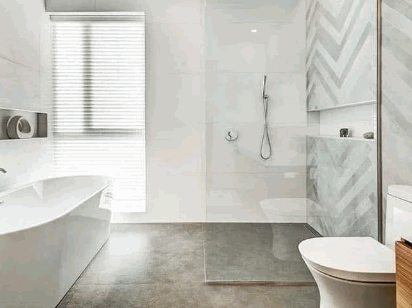
What Are The Benefits Of Resin Flooring?
When it comes to choosing the right flooring for your bathroom, there are various options available in the market. One of these options is resin flooring, which has been gaining popularity in recent years. In this section, we will discuss the benefits of resin flooring, including its waterproof and non-slip properties, durability, ease of maintenance, and customizable design options. By the end, you will have a better understanding of whether resin flooring is the right choice for your bathroom.
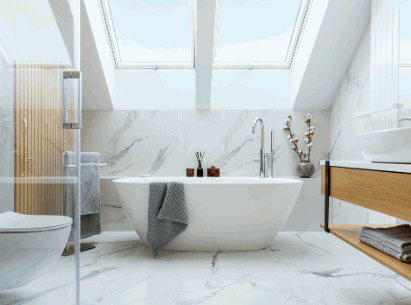
1. Waterproof And Non-Slip
- Make sure the resin flooring material is specifically designed to be waterproof and non-slip, meeting safety standards for wet areas.
- Check the coefficient of friction of the resin flooring to ensure maximum slip resistance, which is essential for bathroom use.
- Regularly clean and maintain the flooring to maintain its non-slip and waterproof properties.
Taking these factors into consideration will aid in making an informed decision about using resin flooring in bathrooms.
2. Durable And Long-lasting
- Quality material: Choose from high-quality epoxy or polyurethane resin to ensure a durable and long-lasting flooring solution.
- Proper installation: It is crucial to have experienced professionals install the resin flooring to maximize its lifespan and durability.
- Regular maintenance: Consistent cleaning and maintenance are essential to maintain the floor’s durability and long-lasting properties.
3. Easy To Clean And Maintain
- Regular Cleaning: Use a mild detergent and water to easily clean and maintain the resin flooring regularly.
- Preventive Maintenance: Avoid using abrasive cleaning materials to prevent damage to the resin surface and keep it easy to clean.
- Periodic Maintenance: Schedule periodic checks for any signs of wear and tear, and address them promptly to maintain the flooring’s integrity and ensure it remains easy to clean and maintain.
4. Customizable And Aesthetically Pleasing
Resin flooring offers versatility, allowing you to create custom designs and patterns, making it highly customizable and aesthetically pleasing. Its seamless application also adds a sleek and modern look, enhancing the visual appeal of any space.
Is Resin Flooring Suitable For Bathrooms?
Is resin flooring suitable for bathrooms? Absolutely! Resin flooring is the perfect choice for bathrooms due to its water-resistant properties, seamless finish, and easy maintenance. It effectively prevents water damage and inhibits mold growth, while also offering a modern and stylish aesthetic. However, it is important to ensure proper installation and ventilation to avoid trapping moisture. For added safety, consider using textured resin for slip resistance and opt for a light-colored resin to create a spacious feel in your bathroom. Regular cleaning and proper sealing are also crucial for maintaining long-term durability and hygiene.
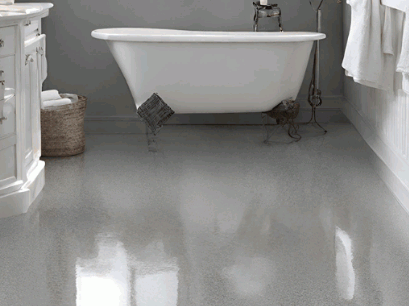
What Are The Considerations For Using Resin Flooring In Bathrooms?
When considering the use of resin flooring in bathrooms, it is important to take into account:
- moisture levels
- proper installation techniques
- maintenance and cleaning routines
It is crucial to accurately assess the moisture levels in the bathroom to ensure that resin flooring is compatible. Meticulous installation is necessary to prevent any water seepage. Regular cleaning and maintenance are essential in maintaining the integrity of the flooring. For the best results, it is recommended to consult with professionals to evaluate if resin flooring is suitable for your specific bathroom needs.
1. Moisture Levels
- Evaluate the moisture levels in the bathroom to determine if they meet the necessary requirements for the installation of resin flooring.
- Confirm that the moisture levels fall within the acceptable range to avoid potential damage to the resin flooring in the future.
- If the moisture levels are elevated, consider implementing measures such as waterproofing or moisture barriers before proceeding with the installation of resin flooring.
2. Proper Installation
- Prepare the surface: Ensure the bathroom floor is clean, dry, and free from any contaminants.
- Primer application: Apply a suitable primer to the prepared surface to promote adhesion.
- Mixing and application: Follow the manufacturer’s instructions for mixing the resin and apply it evenly.
- Curing: Allow the resin to cure for the specified time before walking on the surface.
- Finish: Apply a topcoat for added protection and durability.
Resin flooring has been used since ancient civilizations, such as the Minoans, who utilized natural resins for creating durable floor coatings thousands of years ago. To ensure proper installation, follow these steps:
3. Maintenance And Cleaning
- Regular cleaning: Keep your resin flooring in good condition by regularly cleaning it with a mild detergent and warm water.
- Avoid harsh chemicals: Protect your resin surface by avoiding abrasive cleaners or harsh chemicals that can cause damage.
- Prevent scratches: Place protective pads under furniture legs to prevent scratches on your resin flooring.
- Immediate spill cleanup: In case of spills, promptly clean them up to prevent any potential staining or damage to your resin flooring.
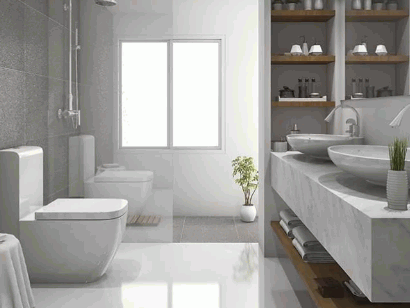
What Are The Alternatives To Resin Flooring In Bathrooms?
While resin flooring may be a popular choice for bathrooms due to its durability and water-resistant properties, it may not be the best fit for everyone. In this section, we will discuss the alternatives to resin flooring for those seeking a different option for their bathroom floors. From ceramic and porcelain tiles to vinyl, natural stone, laminate, and engineered wood flooring, we will explore the pros and cons of each and help you determine which may be the most suitable choice for your specific needs and preferences.
1. Ceramic Or Porcelain Tiles
- Cost: Ceramic and porcelain tiles are both cost-effective options, making them suitable for various budget ranges.
- Installation: The installation process for these tiles typically involves preparing the subfloor, applying mortar, laying the tiles, grouting, and sealing.
- Maintenance: To maintain the appearance and longevity of the tiles, regular cleaning is necessary.
Ceramic and porcelain tiles have been utilized in various cultures for thousands of years, with evidence of their use dating back to ancient Egypt and Mesopotamia.
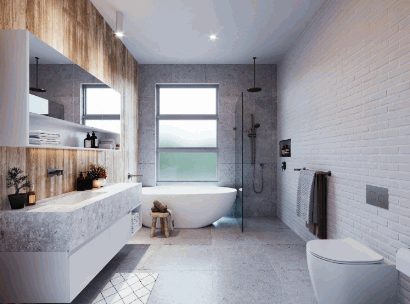
2. Vinyl Flooring
- Vinyl flooring is a budget-friendly choice for bathrooms.
- It is resistant to water, making it perfect for wet areas.
- Vinyl comes in a variety of designs, including wood, stone, and tile looks.
- Installation is relatively simple and can be done over existing floors.
- Regular cleaning and minimal maintenance are necessary to maintain the quality of vinyl flooring.
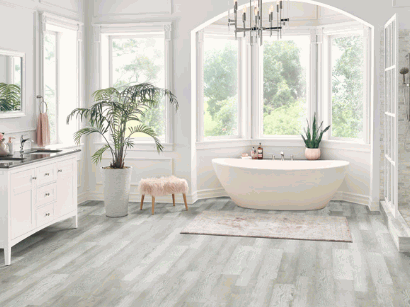
3. Natural Stone
- Natural stone, such as marble or granite, offers a luxurious and elegant look for bathroom flooring.
- It provides a durable and long-lasting flooring solution, resistant to wear and tear in high-moisture areas.
- Proper sealing and maintenance are crucial for preserving the natural beauty and functionality of natural stone floors.
Considering natural stone for bathroom flooring? Choose from marble, granite, or limestone for a timeless, sophisticated ambiance. Ensure professional installation and regular sealing to maintain its pristine appearance and performance.
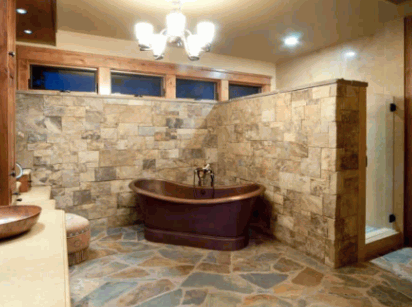
4. Laminate Flooring
- Determine the appropriate thickness of laminate flooring for use in a bathroom environment.
- Before installation, make sure the bathroom floor is clean, dry, and level.
- Allow the laminate flooring to adjust to the humidity and temperature of the bathroom.
- To prevent water damage, install a moisture barrier before laying down the laminate flooring.
- Follow the manufacturer’s instructions carefully to properly install and seal the laminate flooring, ensuring no water seepage occurs.
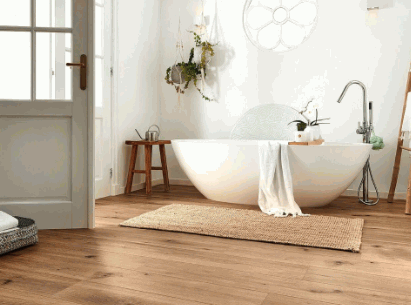
5. Engineered Wood Flooring
- Engineered wood flooring is a great option for bathrooms as it can withstand moisture and temperature changes.
- Prior to installation, it is important to make sure that the subfloor is dry and level to avoid any problems with the engineered wood flooring.
- To prevent water damage and maintain its appearance, it is crucial to regularly clean and maintain the flooring.
Engineered wood flooring is a popular choice for bathroom renovations due to its combination of aesthetics and functionality.
